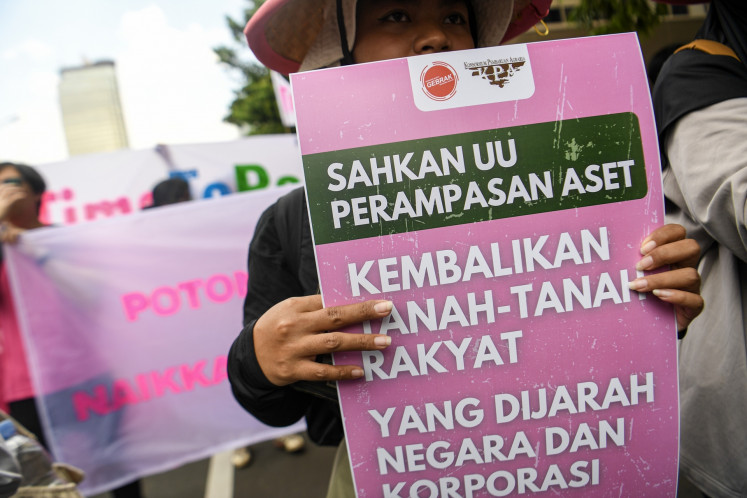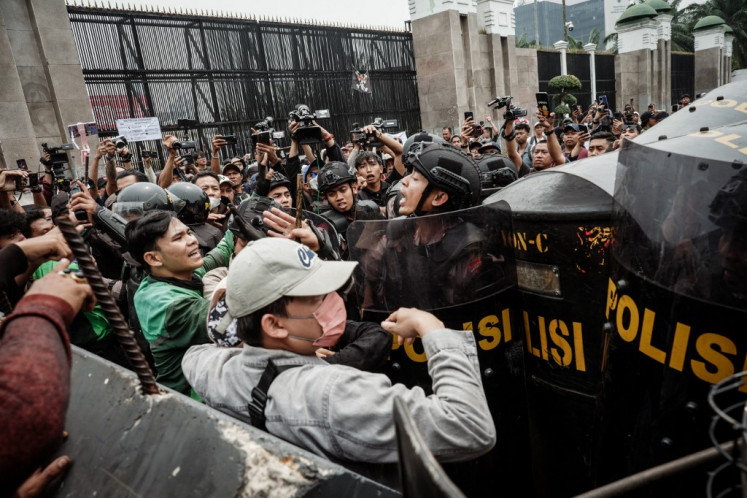Popular Reads
Top Results
Can't find what you're looking for?
View all search resultsPopular Reads
Top Results
Can't find what you're looking for?
View all search resultsIndonesia warned of subsidy time bomb
International observers have once again warned the Indonesian government that its high budget allocation for fuel subsidies, due to rising oil prices, higher fuel consumption and rupiah depreciation, will severely hurt the countryâs economy if no immediate measures are taken to cut the extra budget spending
Change text size
Gift Premium Articles
to Anyone
I
nternational observers have once again warned the Indonesian government that its high budget allocation for fuel subsidies, due to rising oil prices, higher fuel consumption and rupiah depreciation, will severely hurt the country's economy if no immediate measures are taken to cut the extra budget spending.
Indonesia's fuel subsidies, set at Rp 211 trillion (US$18.4 billion) in the 2014 state budget, could overshoot by at least Rp 42 trillion due to the weak rupiah and higher-than-expected fuel consumption, according to a report by Bank of America Merrill Lynch titled Indonesia in Focus: Déjà vu ' Another Fuel Price Hike?
The report, released Thursday, indicated that the additional spending allocation for subsidized fuel would increase the budget deficit to 2.5 percent of gross domestic product (GDP), well above the government's target of 1.7 percent in the budget.
Indonesia has received a round of warnings recently over its fuel subsidy predicament, increasing the pressure on the government to
tackle the issue quickly. In its quarterly report released last week, the World Bank estimated that, without any adjustment in fuel prices this year, state spending would swell by Rp 56 trillion, consequently pushing up the budget deficit to 2.6 percent of GDP.
As most of Indonesia's oil fields were aging, there was additional risk for the state budget stemming from lower-than-targeted oil production, the US-based organization warned. Every reduction of oil lifting (production) by 10,000 barrels per day would reduce revenue by Rp 3 trillion, according to the World Bank, which described Indonesia's fuel subsidy spending as 'poorly targeted, distortional and imposing high opportunity costs and fiscal risks'.
Government officials have acknowledged that the fuel-subsidy predicament could create new fiscal risks at a time when investors' confidence in Indonesia has improved, as risks to its current account ' the major worry among foreign investors last year ' have abated.
'What's important now is not only to improve the current account, but also to undertake [new] fiscal reforms, by ensuring the continuity of fuel-subsidy reforms,' Finance Minister Chatib Basri told The Jakarta Post this week.
'Without those, Indonesia will remain at risk,' he stated.
Last year, Chatib succeeded in lobbying President Susilo Bambang Yudhoyono to raise the price of subsidized Premium gasoline by 44 percent, in a move that forecast a saving to the state coffers of around Rp 40 trillion.
The minister is now pushing for a new subsidy reform, by imposing a fixed-subsidy scheme, where fuel subsidies will be set at a certain level, to guard the fiscal coffers against the unpredictability of fluctuating oil prices and the rupiah exchange rate. So far, Chatib's fixed-subsidy plan has been publicly supported by fellow policymakers, such as Coordinating Economic Minister Hatta Rajasa and Bank Indonesia (BI) Governor Agus Martowardojo.
Analysts expect the fixed-subsidy scheme to be included in the revised 2014 state budget, which will be proposed to lawmakers in April.
If the government does not increase fuel prices in the revised budget, but instead revises its assumptions for the rupiah at 11,500 per US dollar (from 10,500 previously) and the quota for subsidized fuel consumption at 52 kiloliters (from 48 kiloliters previously), then the fiscal deficit may breach the legal threshold of 3 percent of GDP, according to calculations by Japan-based Nomura. In their report released this week, economists from the DBS Bank in Singapore warned that fuel subsidies 'remain a critical issue' to be tackled by President Yudhoyono in his last year in office.
'While the political cycle makes it challenging, President Yudhoyono does not have much to lose if he hikes fuel prices, given that he cannot run in the presidential race,' argued Prakriti Sofat, an economist with Barclays Bank.










